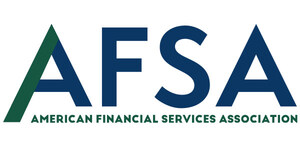
Survey of consumer credit industry shows economic strains, with increased demand for credit from consumers
WASHINGTON, Sept. 12, 2024 /PRNewswire/ -- The American Financial Services Association, the country's largest and oldest national consumer credit trade group, today released its quarterly Consumer Credit (C3) Index survey of leading providers of consumer credit, including mortgages, vehicle financing, personal installment loans, and credit cards.
The C3 Index is the only national survey that provides a look into AFSA member companies' perceptions of business conditions and key business indicators, including how they see the consumer-lending environment evolving in the coming months. The C3 Index provides industry insights beyond what is available in other economic surveys or government statistical reports.
"The C3 Index offers a unique perspective on the consumer credit industry," said AFSA president and CEO Bill Himpler. "Leading into our national elections, this data highlights the ongoing concerns both consumers and credit providers are facing in uncertain economic times."
Tim Gill, AFSA chief economist and VP for research, added: "These results highlight the challenging environment facing consumer lenders in 2024. While it is encouraging to see some signs of optimism reflected in the survey, the headwinds facing consumers and our industry cannot be minimized."
Top Line Results
High interest rates, stubborn inflation, stressed and anxious consumers and a hostile regulatory climate raised headwinds in the 2nd Quarter for the consumer finance industry.
- The survey results indicate that the business environment for consumer credit providers deteriorated in the second quarter of 2024 when compared to the first quarter. The previous survey, in which lenders were asked to compare conditions in the first quarter of 2024 to the fourth quarter of 2023, also showed business conditions had weakened.
There is some good news, however: The margin between those reporting overall worsened vs. improved business conditions narrowed in the second quarter.
- The percentage of respondents reporting conditions improved vs. those who reported worsening conditions was higher than in the previous survey. Of those surveyed, 29.2% reported conditions worsened in Q2, 20.9% said they improved, and half (50%) claimed they were unchanged. In Q1, 38.6% reported conditions worsened, 19.3% said they improved, and 42.1% claimed they were unchanged.
- When asked if customer demand for loans, funding costs, and performance of outstanding loans improved, worsened, or stayed the same in Q2, respondents felt loan demand improved on balance, but that funding costs and loan performance worsened.
Looking ahead, lenders' views on the six-month outlook were less optimistic.
- 29.2% of respondents expect overall business conditions to worsen over the next six months, 25% expect improvement, and 45.8% expect them to remain largely unchanged, a reversal from the first quarter, when more respondents expected improved rather than weaker conditions.
- Survey participants were asked whether they expect customer demand for loans, funding costs, and outstanding loan performance will improve, worsen, or stay the same over the next six months. While expected loan demand and expected funding costs remained positive in Q2, expected loan performance was increasingly negative in Q2 compared to Q1 sentiment.
Respondent Comments
- "While we saw a slight increase in demand for the quarter, it is a decrease compared to prior years. We are seeing a hesitancy in borrowing and an increase in delinquency. We are starting to notice the effect of rising prices for our consumers. They aren't borrowing because they can't afford to, and they aren't paying because they are running out of funds after paying for essential items."
- "Cost of capital is more expensive, but stable at this time. Lots of loan demand, but fewer applicants qualify based on budget."
- "Expense control and cost of funds continue to be our main concern and focus."
- "Delinquency is still high."
- "Inflation has caused delinquency to rise to levels unheard of in prior years."
- "Loan demand is not consistent. It's up and down. Believe it will be that way through year- end until the election is over."
- "Inflation impacting consumer and business's ability to pay/perform. This coupled with it being an election are creating headwinds."
- "Used vehicle values play a big role in our financials as well. We expect those values to continue to worsen in the second half of the year."
- "Toughest environment, equal to 2009. Economy is very bad [in the region in which we operate.]"
SOURCE American Financial Services Association







Share this article